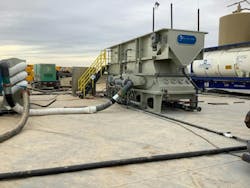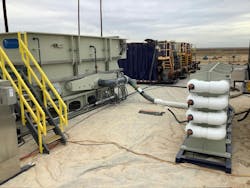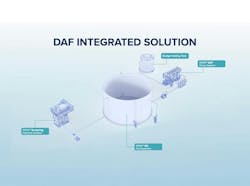How advanced biological technologies overcome complex wastewater treatment challenges in the oil and gas sector
A titan of the global economy, the oil and gas industry faces pressing environmental challenges — particularly in wastewater management. The wastewater in this sector is characterized by a complex mixture of contaminants, including total organic carbon (TOC), total dissolved solids (TDS), oils, greases and recalcitrant organic compounds across upstream, midstream and downstream processes.
Beyond the nature of the wastewater itself, the U.S. Environmental Protection Agency (EPA) mandates strict pretreatment programs and effluent guidelines, necessitating that facilities manage pollutant levels before discharging wastewater into municipal systems or surface waters. Noncompliance can lead to severe penalties, including fines and operational shutdowns.
Advanced biological technologies have emerged as a critical solution to these issues, offering robust, adaptable and sustainable treatment options. These technologies can significantly improve treatment efficiency, reduce energy consumption and ensure compliance with stringent environmental regulations.
Enhancing treatment stability with fixed-film technologies
Fixed-film biological treatment technologies, such as moving bed biofilm reactor (MBBR) and integrated fixed-film activated sludge (IFAS), can help oil and gas manufacturers manage the complex wastewater compositions. These systems are designed to support high biomass concentrations, which significantly enhance treatment stability and resilience against fluctuations in organic loads.
MBBR and IFAS systems utilize fixed-film carriers to increase biomass retention, improving the performance of biological systems. This approach is particularly effective in treating wastewater with high levels of TOC and recalcitrant organic compounds that resist conventional treatment methods.
Sequencing batch reactors for variable flow management
Sequencing batch reactors (SBR) offer a flexible and efficient solution for treating variable flows and loading patterns, which are common in facilities with fluctuating production schedules or seasonal variations in waste streams. SBR systems operate in a batch mode, allowing for the adjustment of treatment cycles to accommodate changes in wastewater characteristics. This adaptability ensures that even the most complex petrochemical contaminants are effectively treated, minimizing the risk of system upsets and regulatory violations. The use of SBR technology is also important in maintaining compliance with the EPA, which mandates specific effluent quality standards.
Membrane bioreactors for high-quality effluent
Membrane bioreactors (MBR) integrate biological treatment with membrane filtration, creating a robust solution for producing high-quality effluent. MBR systems are particularly effective in removing suspended solids, bacteria and viruses, making them suitable for applications requiring stringent discharge standards.
The combination of biological degradation and membrane separation in MBR systems enhances the removal of pollutants such as biochemical/chemical oxygen demand (BOD/COD), as well as nutrients such as nitrogen and phosphorus. This technology is increasingly being adopted in the oil and gas industry to meet the growing demand for water reuse and recycling, reducing the environmental impact of wastewater discharge.
Addressing recalcitrant compounds
The presence of recalcitrant organic compounds in petrochemical wastewater poses significant challenges for conventional biological treatment systems. Advanced biological processes, which include the use of specialized microbial consortia and bioaugmentation, can facilitate the degradation of these persistent pollutants.
These processes involve the introduction of specific microorganisms or enzymes that can break down complex organic molecules, improving the overall efficiency of the treatment system. This approach is essential for ensuring compliance with environmental regulations and preventing the accumulation of hazardous compounds in the environment.
Integrated treatment solutions for comprehensive wastewater management
Integrated treatment solutions that combine multiple technologies are a powerful way to address the diverse challenges of oil and gas and petrochemical wastewater management. These solutions include a combination of dissolved air flotation (DAF), MBBR, SBR and sludge dewatering technologies, tailored to the specific needs of each application.
By integrating these technologies, treatment systems can achieve superior effluent quality, reduce chemical usage and lower energy consumption. This holistic approach not only enhances treatment efficiency but also supports sustainability goals by minimizing the environmental footprint of wastewater treatment operations.
The benefits of advanced biological technologies
In the oil and gas sector, optimizing biological treatment processes is essential to address the complex mixture of contaminants present in wastewater.
Greater energy efficiency. Traditional wastewater treatment methods often require high energy inputs, which can be costly and environmentally unsustainable. On the other hand, advanced biological technologies are designed to minimize energy consumption while maintaining high treatment efficiency.
For instance, the use of mobile carriers in biological systems allows for process intensification without significant infrastructure changes. This approach not only reduces energy usage but also extends the life of treatment systems by accommodating increased contaminant loads.
Lower costs. By optimizing biological processes and incorporating innovative solutions such as DAF systems, facilities can achieve significant savings in operational costs. These technologies are designed to handle variability in wastewater composition, ensuring downstream biological processes are not overwhelmed and reducing the need for costly chemical interventions.
Greater resilience. Biological processes such as MBR and SBR are equipped to handle variable flows and loading patterns, making them ideal for facilities with fluctuating production schedules or seasonal variations in waste streams. These systems enhance resilience by supporting higher concentrations of biomass, which improves the treatment process’s ability to recover from process upsets.
This capability is particularly important in the petrochemical industry, where the presence of non-biodegradable compounds can pose significant challenges to conventional treatment methods. By incorporating advanced biological technologies, facilities can ensure consistent effluent quality and regulatory compliance — even under challenging conditions.
Greater sustainability. Water reuse is an emerging strategy that contributes to sustainability by reducing the demand for fresh water and minimizing wastewater disposal. By implementing advanced biological treatment systems, facilities can treat wastewater to a quality suitable for reuse in various industrial applications, thus alleviating pressure on local water supplies and reducing environmental impact.
The integration of water reuse strategies with biological treatment technologies also allows manufacturers to recover valuable resources from wastewater streams. For example, treated water can be reused in hydraulic fracturing operations, reducing the volume of wastewater that requires disposal and lowering overall treatment costs. This approach not only supports sustainability goals but also enhances the economic viability of wastewater treatment operations in this industry.
Learn more
As the oil and gas industry continues to evolve, the adoption of advanced biological solutions will be essential in addressing the complex challenges of wastewater treatment and compliance. These technologies are poised to help manufacturers continue to navigate evolving regulatory landscapes, enhance operational efficiency and achieve long-term sustainability goals.
Learn more at worldwaterworks.com.





